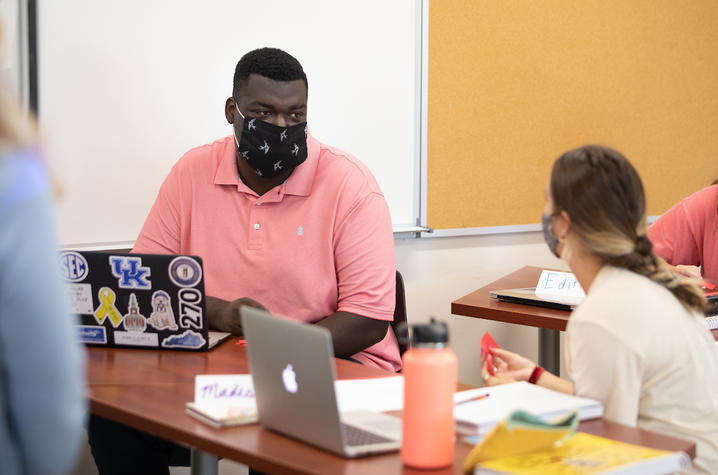Step by Step of What to Expect If You Hear From a Contact Tracer

LEXINGTON, Ky. (Aug. 31, 2020) — The University of Kentucky Health Corps team is leading the charge to support a safe reinvented normal on campus. Included in their work is contact tracing of COVID-19 to stop the spread of it on campus. The contact tracer’s goal is to reach every person who has tested positive and restrict their contact with others before the virus can spread to another.
Here is a step-by-step explanation of what to expect if you hear from a contact tracer. It's important to listen to and follow the instructions of any Health Corps case manager who contacts you. It's also good to know the terminology:
- Isolation separates sick people with a contagious disease from people who are not sick. People who test positive are isolated.
- Quarantine separates and restricts the movement of people who were exposed to a contagious disease to see if they become sick. People who have been in close contact with a sick person or positive case are quarantined.
Initial contact from Health Corps:
- A Health Corps contact tracer will call to inform you that you have tested positive and will explain what the test result means including details of symptoms, high-risk pre-existing medical conditions and what to do if more severe symptoms develop. They will also discuss resources available to you and create an isolation plan with you. This includes addressing any academic, food or housing needs — regardless of whether a student lives on or off campus.
- They will also ask you who you have been in close contact with — the Centers for Disease Control and Prevention (CDC) defines close contact as within 6 feet for more than 15 minutes even if you were wearing a face covering.
- After they get off the call with you, arrangements are made for a wellness connector to call you. Meanwhile, the contact tracer will start to reach out to UK-affiliated contacts you provided and inform them they came into close contact with someone who tested positive for COVID-19. Those who receive a call will never know the name of the person who tested positive — that information remains confidential. Contact tracers will contact students, faculty and staff at UK who are considered to have had high-risk exposure (close contact) with a positive case.
- For any contacts who are not members of the UK community, such as a friend in the positive case's hometown, Health Corps sends those names to the individual’s local health department, and that health department will take care of the contact tracing with those people.
- The key here is that people who have been in close contact with a positive case are asked to quarantine. This quarantine process prevents the spread of the virus among people who may have contracted it but don't know that yet.
Next steps for those who test positive:
- If symptoms are mild, the individual will be asked to continue communicating with their local health department. If concerns are noted in the initial call, the patient receives immediate follow-up on a case-by-case basis depending on needs.
- The local health department (wherever the individual is isolating) will provide the final release from isolation (an actual document) to those who tested positive. That documentation must be sent to Health Corps. Once that document has been received, a team member will respond through email with a final release.
- It is the student’s responsibility to keep their contact information up to date in the MyUK portal, should a case manager ever need to contact you. Students should also remember to report to faculty that they will not be in class due to testing positive or due to quarantining because of contact with a positive case. Health Corps does not provide that information to faculty members.
Contact tracing will continue throughout the Fall 2020 semester and as long as necessary. UK is taking the advice of and working closely with local health departments and public health officials during this time. If you have questions or concerns about COVID-19 on campus, please email healthcorps@uky.edu or call 859-218-7233 (SAFE).
As the state’s flagship, land-grant institution, the University of Kentucky exists to advance the Commonwealth. We do that by preparing the next generation of leaders — placing students at the heart of everything we do — and transforming the lives of Kentuckians through education, research and creative work, service and health care. We pride ourselves on being a catalyst for breakthroughs and a force for healing, a place where ingenuity unfolds. It's all made possible by our people — visionaries, disruptors and pioneers — who make up 200 academic programs, a $476.5 million research and development enterprise and a world-class medical center, all on one campus.




